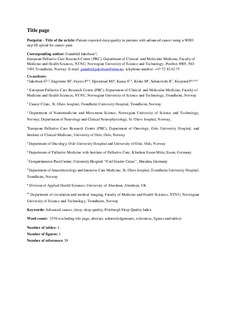| dc.contributor.author | Jakobsen, Gunnhild | |
| dc.contributor.author | Engstrøm, Morten | |
| dc.contributor.author | Fayers, Peter | |
| dc.contributor.author | Hjermstad, Marianne Jensen | |
| dc.contributor.author | Kaasa, Stein | |
| dc.contributor.author | Kloke, Marianne | |
| dc.contributor.author | Sabatowski, Rainer | |
| dc.contributor.author | Klepstad, Pål | |
| dc.date.accessioned | 2019-02-22T11:42:54Z | |
| dc.date.available | 2019-02-22T11:42:54Z | |
| dc.date.created | 2018-10-02T11:26:22Z | |
| dc.date.issued | 2018 | |
| dc.identifier.issn | 2045-435X | |
| dc.identifier.uri | http://hdl.handle.net/11250/2587017 | |
| dc.description.abstract | Objective Sleep is often disturbed in patients with advanced cancer. There is limited knowledge about sleep in patients with cancer treated with strong opioids. This study examines sleep quality in patients with advanced cancer who are treated with a WHO Step III opioid for pain.
Methods An international, multicentre, cross-sectional study with 604 adult patients with cancer pain using WHO Step III opioids. Sleep quality was assessed by the Pittsburgh Sleep Quality Index (PSQI) global score (range; 0–21; score >5 indicates poor sleep). PSQI includes sleep quality, sleep latency, sleep duration, sleep efficiency, sleep disturbances, use of sleep medications and daytime dysfunction. Pain and quality of life were assessed by Brief Pain Inventory and European Organisation for Research and Treatment of Cancer Quality of Life Questionnaire Core30.
Results The median age was 62 years, 42% were female, mean Karnofsky performance score (KPS) was 62.5 (±14.2) and mean oral daily morphine equivalent dose was 303 mg/24 hours (±543.8 mg). The mean PSQI global score was 8.8 (±4.2) (range 0–20). Seventy-eight per cent were poor sleepers. All PSQI components were affected, and 44% reported trouble sleeping caused by pain. In the multiple regression model, predictors of PSQI global scores were pain intensity, emotional function, constipation, financial difficulties and KPS (adjusted R2=0.21).
Conclusion The majority (78%) of these patients with cancer treated with Step III opioids experienced poor sleep quality. Pain intensity, emotional function, constipation, financial difficulties and KPS predicted poor PSQI global scores. The clinical implication is that healthcare personnel should routinely assess and treat sleep disturbance in patients with advanced cancer disease. | nb_NO |
| dc.language.iso | eng | nb_NO |
| dc.publisher | BMJ Publishing Group | nb_NO |
| dc.title | Sleep quality with WHO Step III opioid use for cancer pain | nb_NO |
| dc.type | Journal article | nb_NO |
| dc.type | Peer reviewed | nb_NO |
| dc.description.version | acceptedVersion | nb_NO |
| dc.source.journal | BMJ Supportive & Palliative Care | nb_NO |
| dc.identifier.doi | 10.1136/bmjspcare-2017-001399 | |
| dc.identifier.cristin | 1617104 | |
| dc.description.localcode | © the authors 2018. This is the authors' accepted and refereed manuscript to the article. The final authenticated version is available online at: http://dx.doi.org/10.1136/bmjspcare-2017-001399 | nb_NO |
| cristin.unitcode | 194,65,15,0 | |
| cristin.unitcode | 194,65,30,0 | |
| cristin.unitcode | 194,65,25,0 | |
| cristin.unitname | Institutt for klinisk og molekylær medisin | |
| cristin.unitname | Institutt for nevromedisin og bevegelsesvitenskap | |
| cristin.unitname | Institutt for sirkulasjon og bildediagnostikk | |
| cristin.ispublished | true | |
| cristin.fulltext | postprint | |
| cristin.qualitycode | 1 | |
